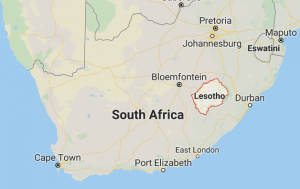Apollo, a multi-function cryptocurrency platform, has signed a memorandum of understanding (MOU) with the government of the tiny nation of Lesotho to explore the implementation of Blockchain and cryptocurrency in a number of government department and initiatives, including education, poverty, employment, and the private sector.

Source: Google Maps
The MOU, which was signed by the Ministry of Communication, Science, and Technology acting on behalf of the government, was announced in an official statement posted on Yahoo! Finance and several other news aggregators.
The Apollo cryptocurrency supports a voting system, decentralized file storage, and will eventually support a marketplace that “will allow users to buy, sell, and trade physical and digital goods using the Apollo currency.”
Steve McCullah, Business Development Director at Apollo, told Finance Magnates that “the company currently has department offices in Europe and the US, with a new operations office currently being set up in Sandton, South Africa to focus on our Africa initiative.”
Press Release
Sandton, 6 November 2019 - Apollo Foundation is announcing an MOU with the nation of Lesotho to design, develop and implement solutions in various government departments and initiatives. View the official press release here:https://t.co/Zkqgaqvpwf#APL #Lesotho pic.twitter.com/Y9y6V65aCT — Apollo Currency (@ApolloCurrency) November 7, 2019
Goals focus on private sector growth, improving public life
According to the announcement, the main objectives of the initiative seem to focus on economic advancement as well as making the government itself operate more efficiently to solve social problems.
The initiative aims to “create new wealth in the private sector by harnessing Apollo fintech solutions, design and implement new government systems, reduce financial crime, maximize the commercialization of the nation's mineral wealth, [and] eradicate challenges like unemployment, poverty and educational constraint.”
The announcement specifically names Lesotho’s import and export sector (which includes garments, diamonds, water, electricity, wool, and mohair), as well as remittances from workers, and the mining and trading of diamonds.
McCullah told Finance Magnates that “although the exact contents of the MOU are currently confidential, we can say that we are working to design a major government platform.” However, he claimed that “if this platform is implemented it would revolutionize the way government functions.”
Is blockchain reliable enough for government systems?
When we asked McCullah why Apollo was suitable for a governmental partnership, he explained that “Blockchain has always been the most secure technology to build government systems, but until now the vulnerabilities have outweighed the benefits.”
And indeed, many would argue that the vulnerabilities still outweigh the benefits--however, McCullah believes that “Apollo is changing this,” and as such, is “allowing governments such as Lesotho the ability to implement systems that could simplify nearly every department in government.”
“Apollo, among many other things, is one to the only blockchains that has the capability to sustain daily transactions for millions of people over an indefinite period,” he claimed. “Unlike nearly every blockchain on the market, Apollo does not suffer from debilitating sustainability issues such as blockchain bloat. Apollo is the first blockchain to implement database sharding, a technology that has made Apollo one of the first truly sustainable blockchains on Earth. “
“Other proprietary technologies like adaptive forging allow Apollo to not only be sustainable but incredibly fast,” he continued, adding that Apollo claims to have one of the fastest transaction speeds on the market “at sub-seconds to 2 seconds per transaction.”
Africa shows potential for the blockchain industry
With a population of just 2.2 million people and a correspondingly small government system, Lesotho--like many other small nations with agile governments--could be well-suited to build, test, and implement blockchain-based systems and their corresponding legal structure that might take years to build and implement in a larger nation.
Indeed, “smaller nations are more agile when it comes to new technologies and providing the right conditions for growth through progressive regulation,” reads an article from 150Sec, a news outlet that covers tech startups. Comparatively, the nation of Malta--which has a population of less than 500,000--has put itself on the map as a global hotspot for the international blockchain industry because of its blockchain.
Africa has also been identified as a market with the potential for huge growth within the blockchain sphere.
A blog post by cryptocurrency exchange OKEx posted in late September of 2019 said that “Africa has laid the foundations for the crypto industry to thrive on the continent, its high inflation economic characteristic encourages the demand for value preservation and bitcoin and other Cryptocurrencies could be an answer for consumers in Africa.”


















